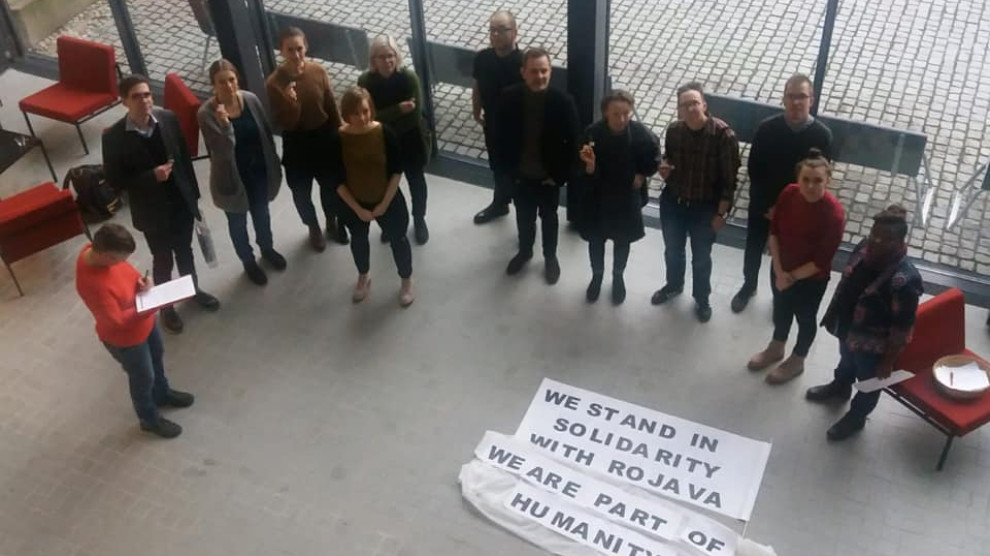Academics in Turku, Finland, show solidarity with Rojava
“Let us not make it easy to destroy humanity or each other. Because if today it is Rojava, who is next?”
“Let us not make it easy to destroy humanity or each other. Because if today it is Rojava, who is next?”

Students of gender studies at Åbo Akademi show solidarity with Rojava revolution before a panel debate later in the afternoon. Teacher and doctoral student at Gender Studies Albina Hipp kept a short speech, to show everyone is part of humanity and to express solidarity with Rojava, in Northern Syria, which has been under attack by Turkey since 9.10. this year.
"In many cultures, life has been symbolised by a tree. In the Nordic mythology, it was called YGGDRASIL, which was the world tree, and under its branches was the most sacred of spaces. This tree was holy and its roots and branches reached everywhere. In Rojava because of the industrial farming and colonialism, the planting of any trees was forbidden up until 9 years ago with the start of the revolution. A tree in Rojava now symbolises “new life” when being planted. Therefore, we have given out little pine tree branches with the tag “I am part of humanity. I stand in solidarity” in our connecting ceremony that we are all part of humanity", Albina remarked.
Furthermore, a statement was released in which participants urged others to take a stand. The statement reads as follows:
“We stand in solidarity with Rojava
The call for an outright stop to the cruel crimes by the Turkish state and its jihadist proxies on Rojava, is necessary.
The fate of the Kurdish people, and the autonomous, culturally diverse area of Rojava, in Northeast Syria, does not end with them. Their fate is entangled as a cord within the many cords that define humanity. In order for humanity to continue to have the ability to survive, and survive as one, diversity must be granted.
The extermination of one of these cords spells doom and extinction for the human race. If one cord is destroyed, it is just a matter of time before other such cords are broken.
If we don't stand in solidarity, to stop the extinction of a dignified way of living, it sets precedence for the same to be done to those cords of humanity that, if deemed improper or functioning on alternative ways to be exterminated as well, in order for those defined as proper to thrive.
Furthermore, this cord of human society that is found in Mesopotamia and that has built Rojava, has created alternative ways that this heavily polluted suffocating world can embrace and benefit from.
Yes, nature, land and other unreplenishable natural resources have generated conflicts over who has the power to utilize, exploit and benefit from it. Not long ago free labor was also such a resource that created repercussions we see and feel until today.
And this is why we stand in solidarity, to call for the end of this invasion war and the profiting from it by sale of arms, by Finland and other countries, to Turkey. Let us not make it easy to destroy humanity or each other. Because if today it is Rojava, who is next?
We encourage all to take a stand for humanity and nature.”
Signed
Peter Nynäs, Dean of Faculty of Arts, Psychology and Theology, Åbo Akademi University
Harriet Silius, professor in Genderstudies, Åbo Akademi University
FD Sofia Sjö, Åbo Akademi University
Albina Hipp, phd student, Genusvetenskap, Åbo Akademi University
Jessika Holmlund, phd student, Genusvetenskap, Åbo Akademi University
Freja Högback, phd student, Genusvetenskap, Åbo Akademi University
Ylva Perera, phd student, Åbo Akademi
FD Katarina Båth, Åbo Akademi
FD Ylva Gustafsson, Åbo Akademi University
Dr. Kasper Brasken, Åbo Akademi University
FD Mio Lindman, Åbo Akademi University
Niklas Högnäs, Åbo Akademi University
FD Linda Bäckman, Åbo Akademi University
PM Jenni Kronqvist, HR specialist, Åbo Akademi University
Nana Blomqvist, phd studen, Åbo Akademi University
Annina Forsblom, student, president of gender studies association Judith at Åbo Akademi
PD Lotta Palmgren, Åbo Akademi University